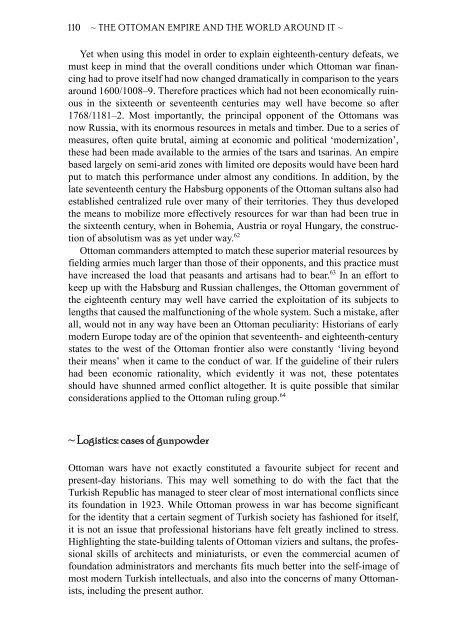The Ottoman Empire and the World Around It - Course Information
The Ottoman Empire and the World Around It - Course Information
The Ottoman Empire and the World Around It - Course Information
Create successful ePaper yourself
Turn your PDF publications into a flip-book with our unique Google optimized e-Paper software.
110 ~ THE OTTOMAN EMPIRE AND THE WORLD AROUND IT ~<br />
Yet when using this model in order to explain eighteenth-century defeats, we<br />
must keep in mind that <strong>the</strong> overall conditions under which <strong>Ottoman</strong> war financing<br />
had to prove itself had now changed dramatically in comparison to <strong>the</strong> years<br />
around 1600/1008–9. <strong>The</strong>refore practices which had not been economically ruinous<br />
in <strong>the</strong> sixteenth or seventeenth centuries may well have become so after<br />
1768/1181–2. Most importantly, <strong>the</strong> principal opponent of <strong>the</strong> <strong>Ottoman</strong>s was<br />
now Russia, with its enormous resources in metals <strong>and</strong> timber. Due to a series of<br />
measures, often quite brutal, aiming at economic <strong>and</strong> political ‘modernization’,<br />
<strong>the</strong>se had been made available to <strong>the</strong> armies of <strong>the</strong> tsars <strong>and</strong> tsarinas. An empire<br />
based largely on semi-arid zones with limited ore deposits would have been hard<br />
put to match this performance under almost any conditions. In addition, by <strong>the</strong><br />
late seventeenth century <strong>the</strong> Habsburg opponents of <strong>the</strong> <strong>Ottoman</strong> sultans also had<br />
established centralized rule over many of <strong>the</strong>ir territories. <strong>The</strong>y thus developed<br />
<strong>the</strong> means to mobilize more effectively resources for war than had been true in<br />
<strong>the</strong> sixteenth century, when in Bohemia, Austria or royal Hungary, <strong>the</strong> construction<br />
of absolutism was as yet under way. 62<br />
<strong>Ottoman</strong> comm<strong>and</strong>ers attempted to match <strong>the</strong>se superior material resources by<br />
fielding armies much larger than those of <strong>the</strong>ir opponents, <strong>and</strong> this practice must<br />
have increased <strong>the</strong> load that peasants <strong>and</strong> artisans had to bear. 63 In an effort to<br />
keep up with <strong>the</strong> Habsburg <strong>and</strong> Russian challenges, <strong>the</strong> <strong>Ottoman</strong> government of<br />
<strong>the</strong> eighteenth century may well have carried <strong>the</strong> exploitation of its subjects to<br />
lengths that caused <strong>the</strong> malfunctioning of <strong>the</strong> whole system. Such a mistake, after<br />
all, would not in any way have been an <strong>Ottoman</strong> peculiarity: Historians of early<br />
modern Europe today are of <strong>the</strong> opinion that seventeenth- <strong>and</strong> eighteenth-century<br />
states to <strong>the</strong> west of <strong>the</strong> <strong>Ottoman</strong> frontier also were constantly ‘living beyond<br />
<strong>the</strong>ir means’ when it came to <strong>the</strong> conduct of war. If <strong>the</strong> guideline of <strong>the</strong>ir rulers<br />
had been economic rationality, which evidently it was not, <strong>the</strong>se potentates<br />
should have shunned armed conflict altoge<strong>the</strong>r. <strong>It</strong> is quite possible that similar<br />
considerations applied to <strong>the</strong> <strong>Ottoman</strong> ruling group. 64<br />
~ Logistics: cases of gunpowder<br />
<strong>Ottoman</strong> wars have not exactly constituted a favourite subject for recent <strong>and</strong><br />
present-day historians. This may well something to do with <strong>the</strong> fact that <strong>the</strong><br />
Turkish Republic has managed to steer clear of most international conflicts since<br />
its foundation in 1923. While <strong>Ottoman</strong> prowess in war has become significant<br />
for <strong>the</strong> identity that a certain segment of Turkish society has fashioned for itself,<br />
it is not an issue that professional historians have felt greatly inclined to stress.<br />
Highlighting <strong>the</strong> state-building talents of <strong>Ottoman</strong> viziers <strong>and</strong> sultans, <strong>the</strong> professional<br />
skills of architects <strong>and</strong> miniaturists, or even <strong>the</strong> commercial acumen of<br />
foundation administrators <strong>and</strong> merchants fits much better into <strong>the</strong> self-image of<br />
most modern Turkish intellectuals, <strong>and</strong> also into <strong>the</strong> concerns of many <strong>Ottoman</strong>ists,<br />
including <strong>the</strong> present author.


